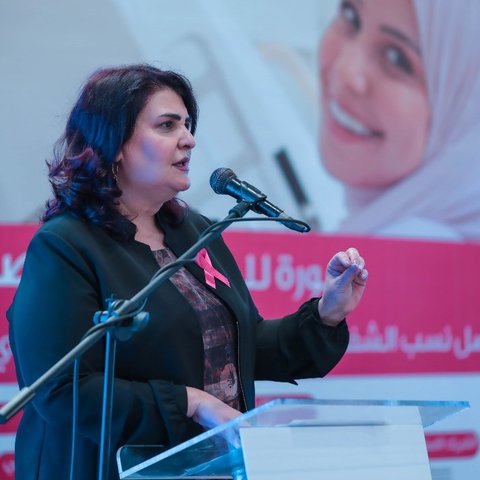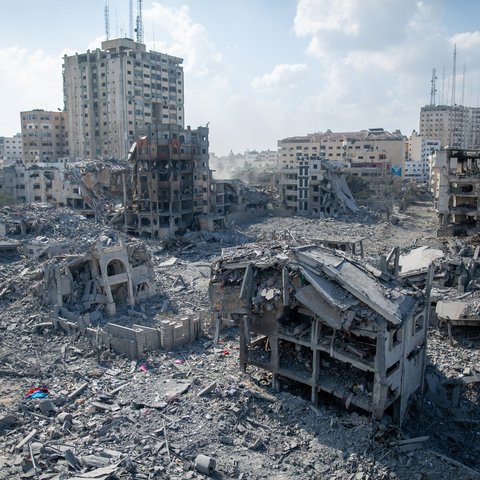“Every day is worse than the day before”: diary from Gaza
Fidaa Alaraj works for Oxfam in Gaza. She's been sending us audio notes from the region, telling us about her daily reality since the crisis escalated on 7 October.
Some of this content may be distressing.
Saturday 7 October
The situation in Gaza before the attacks today is well known.
The children and even the adults have been suffering for years, from panic attacks, from PTSD, from difficulties in sleep, from trust issues... and it takes time to heal, it takes time to get better from these mental health issues. But time is not allowed in Gaza.
We don’t have time to heal because before you take a genuine step towards healing there is another event that [takes you] back to square one. So the events of today will trigger extra mental health issues, but also hinder the healing processes that were going on.
We will need a very long time to treat these effects.
8 October
The second day... it already feels like it’s [the] second week or second month because it’s been a very heavy night... We spent a very long night that felt endless.
“Being a mother of five children, I couldn’t even sleep. I felt I was guarding their sleep. That if I slept for a bit, something would happen, as if me being awake would prevent anything from happening, but it’s just how it felt.”
Fidaa Alaraj
In Gaza we have over 20,000 [internally displaced people] who left their houses, hosted in shelters, makeshift shelters which are schools that have been opened to receive them.
In terms of destruction or the strikes of last night, they targeted so many types of buildings. Most horrifying of all are the residential buildings, without any sort of warning. Targeting those buildings while people are still in them, killing whole families, massacres. You can’t call them anything else but a massacre of civilian people in their houses, asleep or awake.
This kept happening, all night long, and until the early hours of the morning, and it is continuing until this moment.
11 October
I think it’s important to talk about the shelters in Gaza and the meaning of the word “shelter”.
Seeing the mass evacuations of whole blocks and families, people leaving their houses because they were warned to leave them... people hear that they are leaving for shelters.
A shelter in Gaza is not a reinforced basement... it’s literally schools... they are schools and that’s it. They don’t hold stock of equipment or non-food items, mattresses or sleeping equipment, they’re not ready to receive families, they’re not ready for an everyday life, they only provide a place to sleep or to stay in. And the latest statistics [say] there has been more than 250,000 people who are seeking refuge in those shelters, so you can imagine how pressured they are, the capacity they have, [they] don’t even have any space for people to stay or to sleep. And some of them have already been targeted, so they are not very safe. They are very near the places people leave their houses because of the bombing. So I just wanted to clarify, when you hear shelter, in Gaza, what does it mean.
13 October, 7pm
This is probably the last message I can send because they are threatening to cut off the internet at midnight this night.
We have moved twice, my family and I. Once two days ago from our house to my in-laws' house, because it’s a little less dangerous. I wouldn’t use the word safer.
It’s the city centre that’s supposed to be very safe usually. It’s like a ghost city.
I went back today to our house just to collect some stuff before heading south again, and the bombings and the shaking and the broken buildings and glass, it’s un-describable.
I don’t know if we will survive another night. I don’t know if we’ll be on the move again. I don’t know how or if this will end, ever.
16 October, 7pm
What we’re seeing on the news and what we’re hearing from healthcare staff, is that when a house is bombed and whole families are wiped [out], there is no one left to identify the bodies.
Yesterday we saw hundreds of bodies buried in collective cemeteries, unidentified.
If there is a baby or a small child or a toddler who is left from one of these bombings, there’s no way to identify that baby or that child.
This is really, really concerning. I’m thinking of the after, if there is any after. What are we gonna do, how are we gonna deal with these children? The registration, identification, documentation, the legal status of these children... if they survive their injuries.
20 October, 5pm
The hospitals are being asked to evacuate over and over again.
Even the bigger ones, the major ones, are running out of all medical supplies, all disposables, equipment, fuel to run the facilities of the hospitals.
They are overwhelmed, they are working with increased pressure, and now when they are asked to evacuate or when they are threatened, you can imagine what does that mean for hospitals.
21 October, 1pm
Today I want to speak about what does it mean that humanitarian aid has entered Gaza, or is starting to enter Gaza.
On the Rafah terminal [Egypt-Gaza border] there is tonnes of humanitarian aid... waiting to be allowed in, but what’s allowed in is 20 trucks so far. This is obviously so much less than needed. But I wanna raise some points about the entered aid as it is.
This aid doesn’t contain any fuel. Why is fuel so important? Mainly it’s important for hospitals to be able to operate. They’ve been operating on generators for 15 days now and they’re running out of fuel. Some have already announced that they ran out of fuel completely, so they’re unable to operate any equipment.
The ambulances, I’ve been hearing so many tales, so many incidents, where people call an ambulance, I’ve even witnessed one incident when people in a house nearby was bombed and there was tens of people in need of ambulance, [but] the only ambulances that managed to arrive were two, and then people were moving bodies and the injured people on carts, on donkey carts, on tuk tuks... on every available vehicle.
The other reason why the fuel is much needed is the water. We have some water wells in Gaza strip as a second source of water... so pulling out the water from the wells needs pumps. You need fuel to operate these pumps.
October 22, 5pm
Today is my daughter’s 12th birthday, and to be honest I was glad that she felt excited, she had been counting down to it since the beginning of this month.
But last night she was like, “you know what I wish for my birthday? I just wish that it won’t be my death day. I wish I won’t be targeted by a rocket and the people won’t have to say ‘wow, she was killed the same day that she was born.’”
So, yeah, this is just a glimpse of our everyday life in Gaza.
October 26, 5pm
To describe the humanitarian situation in Gaza currently, we can say it’s only getting worse by the minute. Every day is worse than the day before.
Access to basic needs like food water and the fuel is almost impossible, it’s very difficult.
We’re getting water day by day with so many efforts, coordination... waiting, trying, planning just to get the water for the day.
As for food, it’s noticeably decreasing in the markets as well. It’s very hard to get flour or essential food items.
As for the fuel, it’s well known it’s very very rare, very hard to get it. Access to medical services is out of [the] question, to the point that we’re very careful that no one in the household gets injured by accident or gets ill even, because we know that there is no access to any medical support or medical services whatsoever.
Humanitarian aid entering Gaza is nothing, literally nothing, compared to the huge needs. Even if there is any place that you can get those needs, it’s very difficult, very dangerous, very risky. You go out, or one of your family goes out to get bread or to get water, and there is no guarantee that they come back.
It’s very risky to go even into the shelters. We witnessed the bombing of shelters – designated UN shelters. People were killed inside of them, so it’s very difficult to make the decision to deploy field workers or any humanitarian workers or volunteers to those places as well.
There’s [a] huge invisible need or difficulty, that maybe we feel ashamed to talk about in the face of all this death, which is the trauma. What we go through is obviously traumatic in so many ways. In ways that it’s very difficult to talk about.
You feel that you don’t have the luxury to think about your wellbeing, your mental health or how you feel about things, how it’s affecting you. But what I can say is that I doubt that anyone in Gaza can sleep regularly or normally. Sleep is very rare, very troubled, very disturbed. Anxiety is very high. We worry about everything and about anything. Sometimes it’s the opposite and you stop caring altogether, like... I’m going to die with the next rocket or the next bombing, so it doesn’t matter.
So you’re not even stable, you go between those two points, the extremes, in one day, multiple times. This is what we’re witnessing, but we’re currently inside the trauma. Once this ends, if it’s gonna ever end, the actual real effects of the trauma is gonna start showing.
It should be at the very least possible to try and help people who are dying, practically, horribly, who are being targeted, who are being killed. But our first and foremost demand is to stop this madness, to stop this war, to have an immediate ceasefire and to stop the killing, the mad killing and targeting of civilians. 7,000 are killed, more than 17,000 are injured, almost all of Gaza is destroyed beyond repair.
I think a ceasefire is way overdue.
Today
The Gaza Israel conflict is a catastrophic humanitarian crisis. 2 million people are under siege, with little to no food, water, fuel or electricity. Oxfam is campaigning for an immediate and lasting ceasefire, and preparing to help the people of Gaza as soon as it’s safe.
You can support people in Gaza and Israel
- Sign the petition to call for a lasting ceasefire
- Donate to the Gaza emergency appeal
More posts like this

– Eman Shannan founded Aid and Hope in 2009. It supports women with cancer in Gaza.Oxfam's Women's Rights Fund helps fund it.Eman has been updating us with voice notes from Gaza.

The situation in Gaza is fast-moving and at times confusing. Here's what's happening, and what you can do to help.

Call for a permanent ceasefire, unrestricted humanitarian access and a path to justice.